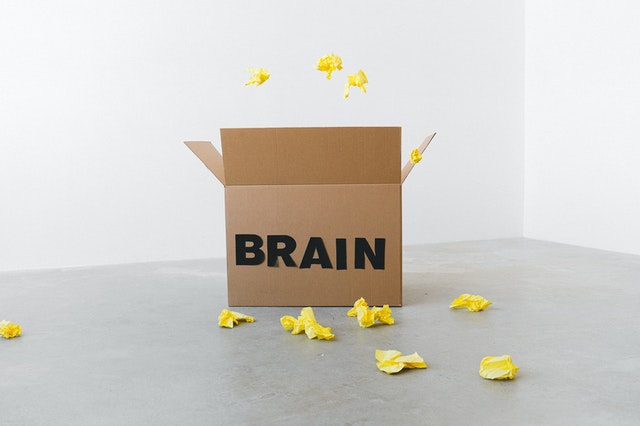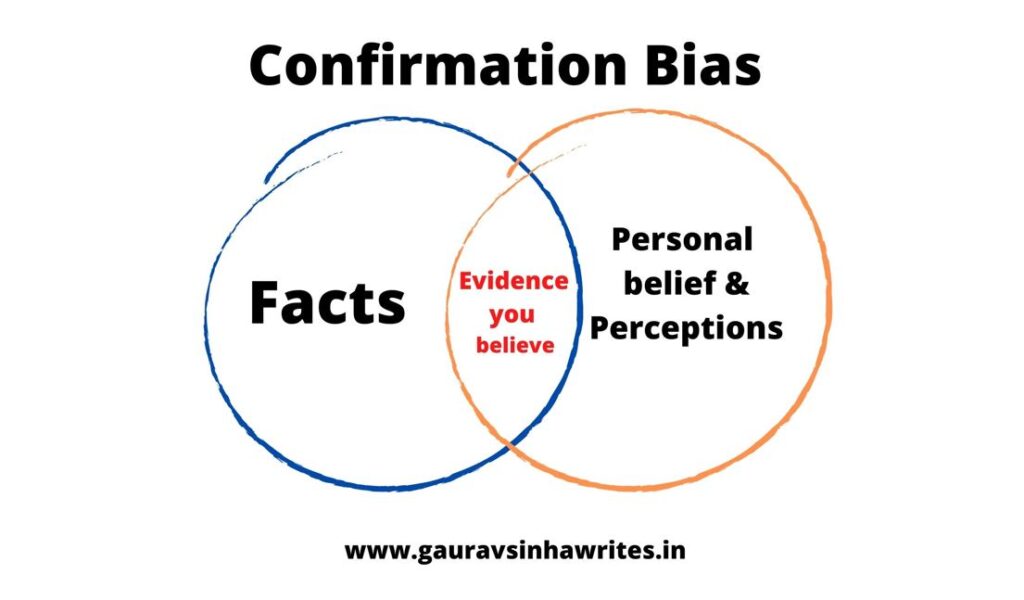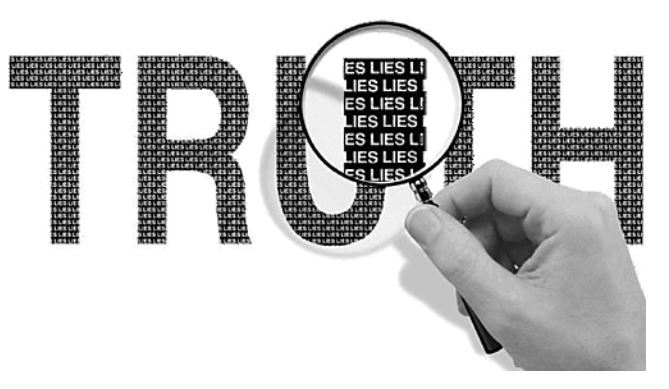
Photo by SHVETS production from Pexels
Confirmation bias makes us focus on the part of our belief system that goes with something we already know.
Have you ever laughed at a joke that was not funny at all? Only because everyone else was laughing. Have you nodded in a yes even when you didn’t understand the concept? It can be in a class or office meeting room? Why? Because the rest of the folks understood, and you didn’t want to look stupid. It’s human psychology, and we all do it – we try to fit in with the crowd and conform to society.
It’s Social Conformity. Something we do unconsciously. The examples prove that we rarely think about how we think, feel and behave. We will discuss social conformity some other time. This write-up is about the most common bias that impacts our lives, and we don’t give it much importance. It’s the confirmation bias.
Next time you hear someone says, I am not biased, don’t trust them. Each of us has our own biases; we either aren’t aware of them or fail to acknowledge them. Read on to know what confirmation bias is? How can you identify this cognitive bias? And ways to reduce it.
A Quick Glance at What We Will Cover:
- What Is Confirmation Bias?
- How Does Confirmatory Bias Impact Us?
- Examples of Confirmation Bias
- Four Ways to Reduce Confirmation Bias?
- Conclusion
What Is Confirmation Bias?

Cognitive biases are flawed thinking based on our experiences, beliefs, observations and perceptions. You may call them our mind’s self-defense mechanism. Confirmation bias makes us focus on the part of our belief system that goes with something we already know. Remember the term pre-conceived notions; it signifies confirmatory bias.
For example, if you have a terrible air travel experience with a particular airline. Next time you travel with them, you only notice things that aren’t great and ignore the good things with the airline. Another common scenario is that if you like an actor, you find good things in their otherwise crap movie. If you don’t like an actor, it doesn’t matter how well they performed. You will focus on the mistakes.
How Does Confirmatory Bias Impact Us?
Cognitive bias makes us overconfident. While confidence is reasonable, overconfidence sets us to fail. This can be harmful to the people around us and us. Confirmation bias stops us from thinking clearly. If we don’t think critically, we are bound to err in our decision-making.
The bias also dictates our interpersonal skills. If we are drowned in our pre-conceived notions, we mess up our social interactions. Try remembering a friend or relative who keeps boasting about themselves and isn’t ready to hear anything you say that opposes their belief. (let’s stay away from political discussions, for now, else we all will end up being the prisoners of our strong beliefs)
Our confirmation bias stops us from learning from younger or less experienced people than us. Try teaching a lesson to your parents or relatives and be ready to hear the famous dialogue “We have seen the world and know much more than you.” This is a fact; they would have much more bad experiences in life and hence, stronger confirmation biases that stop them from accepting the new notions.
Examples of Confirmation Bias
Once you understand confirmation bias, you will realize how deep it runs. It impacts every aspect of our lives, be it relationships, work, business, politics, health and more.
Confirmation Bias in Relationships
Suppose you had an argument with your spouse, so now you make a note that your spouse is unfair. Next time there is a slight disagreement, you again blame your spouse. Who wants to accept mistakes anyway? After a while, your perception of your spouse being unfair becomes so strong that it is a belief. You start looking for reasons to justify your perception and ignore all-other excellent qualities of your spouse.
The best way to handle such a situation is to practice a walkie-talkie mode while discussing something. One person speaks, and the other listens without interrupting, and then the second person gets a chance to speak. This communication method allows our minds to convey our viewpoints and listen to our partners instead of cutting them short and firing our notions non-stop, leading to a never-ending argument.
Confirmation Bias Example in Business
The hiring process is hugely impacted by confirmation bias. The recruitment team may ignore an excellent candidate due to their prior lousy experience or preconception. It can be anything, candidates from a particular ethnicity, college, or employer. Confirmation bias plays a huge role during interviews. Suppose you are interviewing the top 3 candidates from a list of 10. You have already made up your mind that these candidates are perfect for the role. What do you do? You ask questions that highlight their strengths and confirm your belief that they are the right candidate.
The bias stops you from asking questions that go against your belief and end up making wrong hiring decisions. This is why most HRs now follow structured interviews with a set of predefined questions based on the role instead of asking any questions that come to mind (and the answers that pleases your mind)
Four Ways to Reduce Confirmation Bias?
Here are four tips to reduce confirmation bias and improve your thinking.
1. Be Open to Accepting Mistakes
Try to be objective rather than subjective. Confirmation bias makes us look at things subjectively, which may not be a good thing every time. If you are ready to accept that you can be wrong, you have won half the battle of dealing with confirmatory bias. An open-minded person thinks clearly and hence is less judgmental.
Interestingly, there is a related but unpopular bias called Falsification Bias. It’s the opposite of confirmation bias, where you tend to undervalue your own belief and focus on the other side of the fence, i.e., the contradictory views. How about using falsification to test your assumptions and see if you are thinking clearly?
2. Critical Thinking & Looking at the Sunny Side
Change your thinking, don’t be one-sided. Read or listen to others’ points of view before announcing your judgment based on your assumptions. Going back to our argument with spouse example. You must look at other actions, not just one instance that makes them unfair. Instead, try looking at the positive behaviors and actions instead of the negatives.
3. Value Facts More Than Your Beliefs
Look for facts, don’t go by headlines; they can be misleading. We quickly get fooled by fake news, although we know it is not valid because of our confirmatory bias. So, if you support any political leader, you would quickly believe any headline that praises them. On the contrary, when you hear or read anything that isn’t in favor of the leader. And it goes against your belief system. Your first reaction will be to ignore and then discard it. You will rarely try to find out the truth because the fact may challenge your self-esteem and ego. And for humans, nothing is more significant than our ego. What happens in our families, societies, country, and the world is often the result of feeding our egos.
4. Be Cautious of Repeated Lies

Beware of anything if it is repeated again and again. Remember how we mug up books before exams, especially when we hated the subject. However, repetition did work because that’s how our brains register things.
Many industries, especially marketing, media and politics, thrive on repetition. You hear and read the slogans everywhere, the newspaper, print media, social media, television, radio, and it stays on your mind. Whenever you hear anything way too often, step back and take a fresh look. Does this even make sense, or is it just sounding good because of rhyming words?
Wrapping Up!
The intriguing thing about confirmation bias is that it keeps expanding its territory as we age. Self-improvement is a lifelong process, and we must learn to unlearn if we want to evolve as human beings, not just grow old.
What do you think about confirmation bias impacting how we think and interpret information? Any personal experiences you may want to share. Do comment; I would love to read and learn from them.

Feedbacks – Reader’s POV